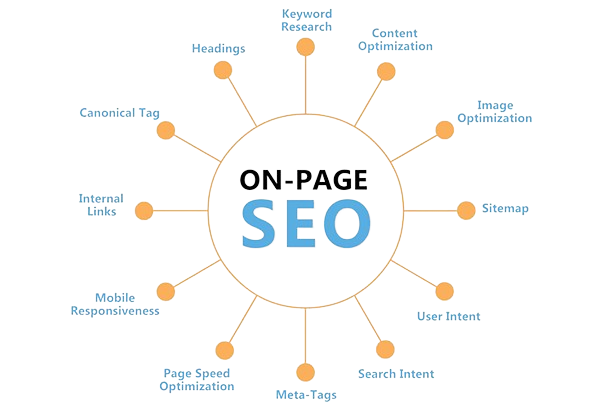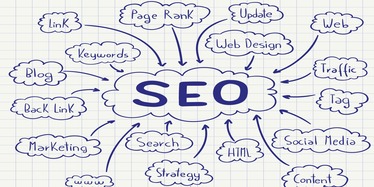
Search engine optimization (SEO) is the practice of optimizing a website's content, structure, and overall online presence to improve its visibility and ranking in search engine results pages (SERPs). It involves techniques like keyword research, on-page optimization, link building, and technical SEO (more on those later) to make the website appealing to both search engines and users.
For most of us today, when we need something—whether it’s an answer, an idea, a product, a strategy, or a service—we start by asking search engines. Google alone gets 3.5 billion searches per day. So just as search engines have become important in our lives, they have also become integral to many business marketing strategies. In fact, organic search is considered to be the highest ROI channel by49% of marketers.
If your business has a website, you need an SEO strategy. According to ahrefs, a popular SEO tool, nearly 91 percent of all websites do not get organic traffic from Google searches.
SEO helps your website rank higher in search results for relevant keywords. This means that when people search for products or services you offer, your business is more likely to be seen, driving more visitors to your website. A well-optimized website that ranks well on search engines signifies to potential customers that your business is relevant and trustworthy. This can influence their decision-making process and make them more likely to choose you over competitors.
Compared to paid advertising, SEO is a relatively cost-effective way to reach a targeted audience. Once your website is optimized, it can continue to generate organic traffic for a long time without needing constant financial investment.
SEO involves researching the keywords and phrases that your target audience uses online. This can provide valuable insights into their needs and interests, which can help you tailor your content and marketing strategies more effectively.
SEO is an essential tool for businesses of all sizes to reach new customers, build brand awareness, and achieve long-term success in the digital marketplace.

Keyword research and planning is the foundation of any successful online marketing campaign. It's the process of identifying the words and phrases that people use to search for information online, and then using that information to optimize your website or content to rank higher in search engine results pages.Utilize free and paid tools like Google Keyword Planner or Keywordtool.io to discover new keyword ideas, search volume estimates, and competition level.
Analyze the data to find keywords that are relevant to your target audience, have enough search volume to be worthwhile, and aren't too competitive to rank for.Organize your keywords into categories based on user intent (informational, commercial, transactional) and create a content strategy that targets each category.The tool then gives us a list of related keywords. a list of related keywords for "ai content" To find more specific keywords that are relevant to your niche, consider using the suggested groups and subgroups in the column to the left.Think of keyword research as the first part of content planning. It’s the process of identifying topics that will then go into production.

On-page SEO is the practice of optimizing the content and structure of your website to improve its ranking in search results. It's basically tweaking your website to make it easier for search engines to understand what your site is about and how it can be relevant to a search query. These optimizations are geared towards making a website more search engine friendly and enhancing its relevance to specific keywords or topics.
Keyword Optimization: Identifying relevant keywords and incorporating them strategically into various on-page elements such as titles, headings, meta descriptions, and content. This helps search engines understand the focus of your website and its individual pages.
High-Quality Content: Creating valuable, informative, and engaging content that satisfies user intent and provides solutions to their queries. Content should be well-structured, easy to read, and include multimedia elements like images and videos where appropriate.
Optimizing title tags and meta descriptions: Title tags and meta descriptions are snippets of text that appear in search results. They're like little billboards for your website, so it's important to make them informative and keyword-rich
Page Speed Optimization: Page speed is a critical factor in both user experience and search engine rankings. Slow-loading pages can lead to higher bounce rates and lower rankings. Optimizing code, leveraging browser caching, compressing images, and reducing server response times are some strategies to improve page speed.
Internal Linking: Internal links connect different pages within the same website. They help search engines understand the site's structure and hierarchy, distribute page authority, and improve navigation for users. By strategically placing internal links, you can guide visitors to other relevant pages and increase their time on site.

Off-page SEO refers to the optimization strategies implemented outside of a website to improve its search engine rankings and increase its online visibility. Unlike on-page SEO, which focuses on optimizing elements within the website itself, off-page SEO involves activities that occur off-site but still impact the website's authority, relevance, and trustworthiness in the eyes of search engines
Link Building:One of the most important components of off-page SEO is link building. This involves acquiring backlinks from other websites to your own. Backlinks are like "votes of confidence" from other sites, indicating to search engines that your site is reputable and worthy of being linked to. However, it's crucial to focus on quality over quantity, as high-quality backlinks from authoritative sites carry more weight in search engine algorithms.
Social Media Engagement: Active participation on social media platforms can indirectly impact your website's SEO performance. Sharing content, engaging with followers, and building a strong social media presence can increase brand visibility, drive traffic to your site, and potentially generate more backlinks.
Content Marketing: Creating high-quality, shareable content is a key aspect of off-page SEO. When you produce valuable content that resonates with your target audience, it's more likely to be shared on social media, linked to from other websites, and referenced by industry influencers, all of which can contribute to improved search engine rankings.
Links: One of the most important aspects of off-page SEO is backlinks. These are links from other websites that point to your site. Search engines see backlinks as a sign that your site is valuable and trustworthy. The more high-quality backlinks you have, the better your chances of ranking higher in search results.
Technical SEO refers to the optimization of your website's infrastructure to make it easier for search engine crawlers to index and understand your content. Unlike traditional SEO, which focuses on content and keywords, technical SEO deals with the technical aspects that affect search engine visibility and ranking.
Ensuring your site loads quickly is crucial for user experience and search engine rankings. This involves optimizing images, minimizing HTTP requests, leveraging browser caching, and using a content delivery network (CDN) if necessary. With the increasing number of users accessing the internet via mobile devices, having a responsive website design is essential. Google also prioritizes mobile-friendly websites in its search results, making mobile optimization a critical aspect of technical SEO. Higher rankings in search results, more organic traffic, and a better user experience (since technical SEO often overlaps with user experience best practices).
Local SEO focuses on optimizing your online presence to attract more business from relevant local searches. It's all about ensuring that your business appears in local search results when people are looking for products or services in your area.
Search engines consider various things to determine which local businesses to show in their results. These factors include things like how close a business is to the searcher, online reviews, and how well a business's information is listed online. Researching and optimizing for local keywords relevant to your business is essential. This involves including location-based keywords in your website content, meta tags, and GMB listing to help search engines understand your geographic relevance.
Share This News